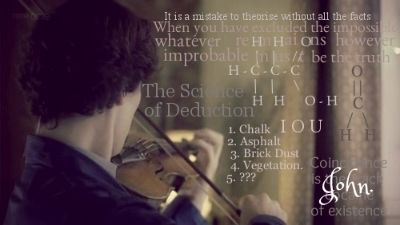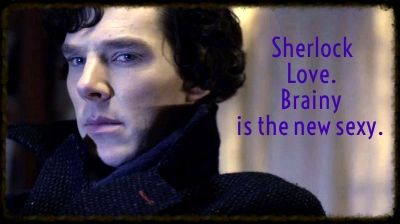
BBC Sherlock Fan Forum - Serving Sherlockians since February 2012.
- YouRepelMe
- Wrong!
 Offline
Offline - From: Amsterdam, the Netherlands
- Registered: March 25, 2013
- Posts: 5
This girl has come very close, I believe.
Check this theory out. I think it covers a lot of loose ends. I didn't buy all of it but it was still worth reading because it's really well-written. Also read the "crackpot theory" she wrote first. It's less believable but SO imaginitive.
A severed head...
Just tea, thanks.
- beekeeper
- John's Army
 Offline
Offline - Registered: March 24, 2013
- Posts: 381
Re: This girl has come very close, I believe.
hmmmm
certainly interesting. I really like the theory
What I'm hesitating over is that the writers don't really depart far from the canon. They play with it and let it inform their work and deconstruct it and turn it inside out but at the end of the day, everything can be traced back to the canon or if not the canon, a side nod to the fanfic/spin offs.
I do wonder if she's just exposing mahoosive plot holes (like, yeah, Moriaty being a long term actor, I wondered about that too. Though one thing I wondered-its not clear whether he has just joined the cast of the long running show. Being an actor is actually a potentially perfect cover for Moriaty because he can claim to have been trying to get jobs for years.
The funny name "like the fairy tale" I just thought was "Grimm" or something. I didn't see it as that significant. Maybe I see but do not observe.
Last edited by beekeeper (March 26, 2013 1:40 am)
---------------------------------------------------------------------------------------------------------------------------------------------------------------------------------
Sherlock Holmes "The question is, has she been working on something deadlier than a rabbit?"
John Watson : "To be fair, that is quite a wide field"
The Hounds of Baskerville
- Cabear5
- Shooting The Wall
 Offline
Offline - Registered: March 15, 2013
- Posts: 11
Re: This girl has come very close, I believe.
Niiiiiice! Our family just fell over each other reading this. Everybody is snuggled up watching Fall again with this theory I'm mind. Very intriguing theory!!
- erunyauve
- The Game Is On
 Offline
Offline - Registered: December 27, 2012
- Posts: 78
Re: This girl has come very close, I believe.
beekeeper wrote:
hmmmm
certainly interesting. I really like the theory
What I'm hesitating over is that the writers don't really depart far from the canon. They play with it and let it inform their work and deconstruct it and turn it inside out but at the end of the day, everything can be traced back to the canon or if not the canon, a side nod to the fanfic/spin offs.
But remember that in canon, Moriarty did have a respectable public identity - that's why it was so hard for Holmes to get anyone to believe that he was a master criminal. I've always liked the theory that Richard Brook is his real identity (there is a thread to that effect on the board). I just wonder that Sherlock doesn't seem to have made the connection. He has an amazing memory - he might delete what he doesn't need to know, but I should think that the list of Carl Powers' classmates would not be consigned to the recycle bin.
--------------------------------------------------------------------------------------------------------------------------------------------------------------------------------
John: OK...That was ridiculous. That was the most ridiculous thing...I've ever done.
Sherlock: And you invaded Afghanistan.
John: That wasn't *just* me.
- beekeeper
- John's Army
 Offline
Offline - Registered: March 24, 2013
- Posts: 381
Re: This girl has come very close, I believe.
haha yes you are right. Perhaps the maths professors of the Victorian era were our 21c kids tv presenters ;-) .
I really like the theory that Richard Brook is his real identity too actually
I've never really liked the Carl Powers thing, the idea that for all his detective life, since Sherlock was, what, 13? Moriaty has been tracking him and behind everything. Bearing in mind that they must be about the same age with Moriaty looking, if anything, slightly younger. Why did he actually take Carl Powers shoes? Did they have any relevance to the story or are we meant to believe that the, presumably thirteen year old Moriaty stole them in order to lay clues for a kid he hadn't even, we assume, at this point, met, twenty years down the line? And did we ever get an explaination of why he took the shoes anyway?
(oh please god do not let Sherlock and Jim turn out to have been classmates. Unlikely, I hope-Jim has a strong Irish accent and Sherlock seems southern English/boarding school/old money. Just too Young Sherlock Holmes I think. Although there is a comedic potential here with Sherlock having been in the same class as Jim for his entire school career without noticing, because he is so amazingly socially rubbish)
Last edited by beekeeper (March 26, 2013 3:09 pm)
---------------------------------------------------------------------------------------------------------------------------------------------------------------------------------
Sherlock Holmes "The question is, has she been working on something deadlier than a rabbit?"
John Watson : "To be fair, that is quite a wide field"
The Hounds of Baskerville
- Cabear5
- Shooting The Wall
 Offline
Offline - Registered: March 15, 2013
- Posts: 11
Re: This girl has come very close, I believe.
I think that, after watching "Falls" again, Sherlock is definitely on to Richard Brook under the lense of Eva-Christine's theory posted above.
When John pucks up the breadcrumb envelope suggesting "Hansel and Gretyl" Nothing is mentioned to Sherlock about this yet. We only know there is a kidnapping of two children that looks political in nature. Sherlock goes through his analysis at the school site and then back at the lab says, "The oil, John. The oil will lead us to Moriarty."
since when does Moriarty come in to play on this case? Only Sherlock, knowing the fairytale/name challenge game of Moriarty is making this connection-suggesting get is well aware of Moriarty's moves ahead of time.
On a separate note. At the school site, Sherlock asks for Anderson to come to him . why? Anderson's a nitwit and the following scene shows Sherlock out-classing his forensic skills on every level and beratin him along the way. I think this is the moment he really needs to provoke this jealousy and doubt, setting his skill apart from the others. This is the catalyst that drives Sally to question how he could make these connections when Anderson clearly can't and setting Sherlock's arrest/fugitive" play" into action.
- erunyauve
- The Game Is On
 Offline
Offline - Registered: December 27, 2012
- Posts: 78
Re: This girl has come very close, I believe.
beekeeper wrote:
haha yes you are right. Perhaps the maths professors of the Victorian era were our 21c kids tv presenters ;-) .
I really like the theory that Richard Brook is his real identity too actually
I've never really liked the Carl Powers thing, the idea that for all his detective life, since Sherlock was, what, 13? Moriaty has been tracking him and behind everything. Bearing in mind that they must be about the same age with Moriaty looking, if anything, slightly younger. Why did he actually take Carl Powers shoes? Did they have any relevance to the story or are we meant to believe that the, presumably thirteen year old Moriaty stole them in order to lay clues for a kid he hadn't even, we assume, at this point, met, twenty years down the line? And did we ever get an explaination of why he took the shoes anyway?
(oh please god do not let Sherlock and Jim turn out to have been classmates. Unlikely, I hope-Jim has a strong Irish accent and Sherlock seems southern English/boarding school/old money. Just too Young Sherlock Holmes I think. Although there is a comedic potential here with Sherlock having been in the same class as Jim for his entire school career without noticing, because he is so amazingly socially rubbish)
Moriarty took the shoes because they had the eczema creme on the laces and the creme had the botulism toxin. That would have pointed to a murder, rather than an accident. Carl Powers' death actually happened in London, which is how Sherlock became involved - he evidently read about the murder and somehow found out that the shoes were missing. He wanted to know why. Powers was from Brighton - we do know Moriarty was at school with him, Irish accent or no. I don't think it's ever implied that Sherlock went to school with him, just that they must have been contemporaries.
Sherlock might have caught Moriarty's interest when he was asking about the shoes, but I agree that it's a bit far-fetched to assume that he became an obsession at that time. More likely, he solved some cases in which Moriarty was involved many years later, and at some point, Moriarty realised that the 'consulting detective' who was becoming a thorn in his side was the same person who had asked about the shoes.
--------------------------------------------------------------------------------------------------------------------------------------------------------------------------------
John: OK...That was ridiculous. That was the most ridiculous thing...I've ever done.
Sherlock: And you invaded Afghanistan.
John: That wasn't *just* me.
- sherlockian111
- Lestrade's Aide
 Offline
Offline - Registered: January 22, 2013
- Posts: 113
Re: This girl has come very close, I believe.
I always assumed that Moriaty took the shoes, just to prove I suppose how silly the police are and to prove how clever he is, and also because he thinks of it as a game.
-------------------------------------------------------------------------------------------------------------------------------------------------------------------
That's the thing about fanfiction, it's always a self-portrait
People want to believe what is easy, rather than what is right.
"One begins to twist facts to suit theories, instead of theories to suit facts"
- lil
- British Government
 Offline
Offline - Registered: June 19, 2013
- Posts: 645
Re: This girl has come very close, I believe.
Just a note on Anderson. , He has been bribed , when SH has people looking for the kidnapped kids , he tells Lestrade they are quicker than the yard and " less easy to bribe." AND then he looks right at Anderson . Thats why he later ASKS for Anderson on forensics , he has seen the set up coming and where from . Obvious ?
- Elvina
- Lestrade's Aide
 Offline
Offline 
- From: UK
- Registered: June 8, 2013
- Posts: 94
Re: This girl has come very close, I believe.
Good. God. I'm mean...that was amazing to read and the blogger makes it all fit but is there really so much going on between the lines? Would the writers make it so complicated? I hope so though! I LOVE the Rumplestiltskin idea and the idea and that Moriarty chose to steal that particular painting...I did find it odd how Sherlock started appearing at press conferences etc as it seems out of character and this theory explains it. I hope the writers have seen this!
- Mary Me
- High Functioning Sociopath
 Offline
Offline 
- From: Germany, Bonn
- Registered: January 8, 2013
- Posts: 3,250
Re: This girl has come very close, I believe.
Too imaginative for me.
~~~~~~~~~~~~~~~~~~~~~~~~~~~~~~~~~~~~~~~~~~
"Falling is just like flying, except there’s a more permanent destination."
"Sherlock Holmes is a great man, and I think one day—if we’re very very lucky—he might even be a good one."
"Would you like to-"
"-have dinner?"
"-solve crimes?"
"Oh"

- Be
- Unregistered
Re: This girl has come very close, I believe.
There is probably somethig right in this theory and yet it is still wrong (IMO)![]()
Moriarty/Brook/or let's call him Jim which is the lowest common denominator has at least built himself an identity that is totally believable for the investigating press (Kitty). There are hints about his past and a career as an actor for several years. This is his daytime occupation as innocent Jim.
Moriarty can be an alias under which he works as consulting criminal.
But the problem with this theory is that Sherlock and John saw Jim at the pool and if he was a famous actor why wasn't he charged and accused under his real name Brook? The police and the "British Government" aren't (so) stupid. Jim would have been identified as actor Brook. Why was Sherlock surprised when he was told that there is no Moriarty when he knew his name Brook and his job. Mycroft watched Jim and caught him to interrogate him. So he found Jim living somewhere under the name Brook.
Sherlock was in court and he talked about him using the name "James Moriarty".
Being a witness I can't imagine Sherlock not telling the complete truth to the judge and jury. He can be cryptic and he can be careful with his words though. If the present person was in fact Richard Brook he would have told them the truth. And if Jim was convicted under a false name the whole trial would be worthless and probably unlawful.
- Elvina
- Lestrade's Aide
 Offline
Offline 
- From: UK
- Registered: June 8, 2013
- Posts: 94
Re: This girl has come very close, I believe.
Yes, I've been thinking about this today and I remembered Sherlock's utter surprise and the whole Richard Brook thing...hmmm...
- Sherlock Holmes
- Administrator
 Offline
Offline 
- From: 221B Baker Street
- Registered: February 7, 2012
- Posts: 5,162
Re: This girl has come very close, I believe.
I've heard this theory or very similar, before. I even wrote my own essay on the topic, but it was just for fun really. It's a nice theory, and there's some interesting points in it, but ultimately I think we just have to believe in the stupidity of the British public to not notice the fact that there was no semi-famous actor named Richard Brook before Moriarty came on the scene, and that his CV was, in fact, entirely made up.
---------------------------------------------------------------------------------------------------------------------------------------------
Eventually everyone will support Johnlock.
Independent OSAJ Affiliate

- sj4iy
- High Functioning Sociopath
 Offline
Offline 
- From: USA
- Registered: June 12, 2013
- Posts: 2,692
Re: This girl has come very close, I believe.
Eh, I don't buy it. He was working on this plot for months...maybe even years. He knows how to pull strings, and he found a bad reporter with a grudge to write the story.
__________________________________________________________________Bigby: Will you shut up?
Colin: Well, maybe if my throat wasn’t so parched, I wouldn’t have to keep talking.
Bigby: Wait, that doesn’t make se-
Coline: Just give me a drink, please.
- Be
- Unregistered
Re: This girl has come very close, I believe.
We need a theory to fit all the facts. Moriarty mentioned by the cabbie, the consulting criminal, the trial, actor-identity Brook, and the real boy Jim once was and Sherlock's note about inventing Moriarty and creating him for his own purposes.
As long as the theory runs against the metaphorical wall it is wrong.
Sherlock greeted Jim by playing a piece of Johann Sebastian Bach. And he told him a story. What did Sherlock know about Jim? What did Jim think that Sherlock knows? A bluff, a double bluff, a tripple bluff....What is the real identity?
This is on the one hand complicated and needs some twists and turns.
Last edited by Be (June 21, 2013 9:15 am)
- Lupin
- Adler's Whip
 Offline
Offline 
- Registered: July 28, 2012
- Posts: 227
Re: This girl has come very close, I believe.
Eh, I have issues with The Reichenbach Fall because Moriarty's character seems to have changed so radically from The Great Game and A Scandal in Belgravia. I don't think there's a level of consistency that runs through the series that involves the fairy tale and metaphysical battle between the master detective and the master criminal.
In The Great Game, Moriarty was about to kill Holmes if Irene Adler hadn't called him. It seemed more about getting rid of a hindrance than destroying an equal. To me, The Reichenbach Fall has a lot that sets it in isolation from the rest of the series, and that disappoints me a bit.
.
Along those lines, the theory really doesn't address the Fall, just a lot of the banter exchanged over the course of the episode.
-----------------------------------------------------------------------------------------------------------------------------------
Is the foil of a detective a thief or a magician?
My Theory on the Fall:
- Be
- Unregistered
Re: This girl has come very close, I believe.
Lupin wrote:
Eh, I have issues with The Reichenbach Fall because Moriarty's character seems to have changed so radically from The Great Game and A Scandal in Belgravia. I don't think there's a level of consistency that runs through the series that involves the fairy tale and metaphysical battle between the master detective and the master criminal.
In The Great Game, Moriarty was about to kill Holmes if Irene Adler hadn't called him. It seemed more about getting rid of a hindrance than destroying an equal. To me, The Reichenbach Fall has a lot that sets it in isolation from the rest of the series, and that disappoints me a bit.
.
Along those lines, the theory really doesn't address the Fall, just a lot of the banter exchanged over the course of the episode.
They haven't changed the character of Moriarty. Something has probably happend.
Jim/Richard was about to commit suicide through the hands of Sherlock and at the same time he was able to kill Sherlock. Told him the story he wanted to tell. Everything he wanted he could get at the pool. The only question is: Who called and what did the caller tell Moriarty to change his mind.
If it was Irene the question is: What was so important that Moriarty wanted to live again (at least for some months)? Suicide and killing got postponed.
Why was Moriarty so upset when he got some information we don't know anything about?
Must be of existential importance then.
I don't believe in a Grimm's fairy tale comparison to the plot of the Reichenbach fall either. It is Moriarty's and Sherlock's story. Or Mofftiss/Doyle's if you like. Moriarty just used the "Hänsel und Gretel" tale to make a point. To tell a story.
TRF is in no way isolated to the rest of the story arc. It is the end of a kind of journey. It ends with Sherlock's note.
If I understand the story (we are already told) about "Moriarty" correctly the story is dreadful and nauseating. I don't like it at all. And I don't know if it was a good idea to do it."People want to know you're human." I don't follow there. Maybe I don't have all information or haven't found it. And nobody wants to be fooled. Like John.
On the one hand they give us a genius detective and show us his intellectual capacities in TRF and on the other hand they nearly destroy him on another level through an subtextual story. It balances out somehow.
On the one hand they hide a part of the plot to the extremes and on the other hand they tell us everything litterally with words, symbols and pattern.
My interpretation is that there is no absolute good or evil, no black and white. Things are not always what they look like and you have to look hard at things to understand them. Prejudice is easy, but real insight into someone's personality is difficult.
- sj4iy
- High Functioning Sociopath
 Offline
Offline 
- From: USA
- Registered: June 12, 2013
- Posts: 2,692
Re: This girl has come very close, I believe.
Irene Adler called Moriarty because she needed someone who could decipher that email from the MOD and use it to gain a profit. Moriarty called off his murder-suicide scheme because he knew he was going to use Sherlock to do it (and, in the process, he would bring Mycroft down, which was why Moriarty wanted Sherlock). Moriarty just "wanted to have a little fun" with Sherlock first...he never really did let him go.
Last edited by sj4iy (June 24, 2013 12:04 pm)
__________________________________________________________________Bigby: Will you shut up?
Colin: Well, maybe if my throat wasn’t so parched, I wouldn’t have to keep talking.
Bigby: Wait, that doesn’t make se-
Coline: Just give me a drink, please.
- Be
- Unregistered
Re: This girl has come very close, I believe.
sj4iy wrote:
Irene Adler called Moriarty because she needed someone who could decipher that email from the MOD and use it to gain a profit. Moriarty called off his murder-suicide scheme because he knew he was going to use Sherlock to do it (and, in the process, he would bring Mycroft down, which was why Moriarty wanted Sherlock). Moriarty just "wanted to have a little fun" with Sherlock first...he never really did let him go.
It is not that obvious. What profit? It is not about the e-mail. "There is more. Much more."
SH: You are not interested in money or power. What is it all for?
It is not for fun either. This is not a funny story. Will go post-watershed, if you ask me.

 1
1 